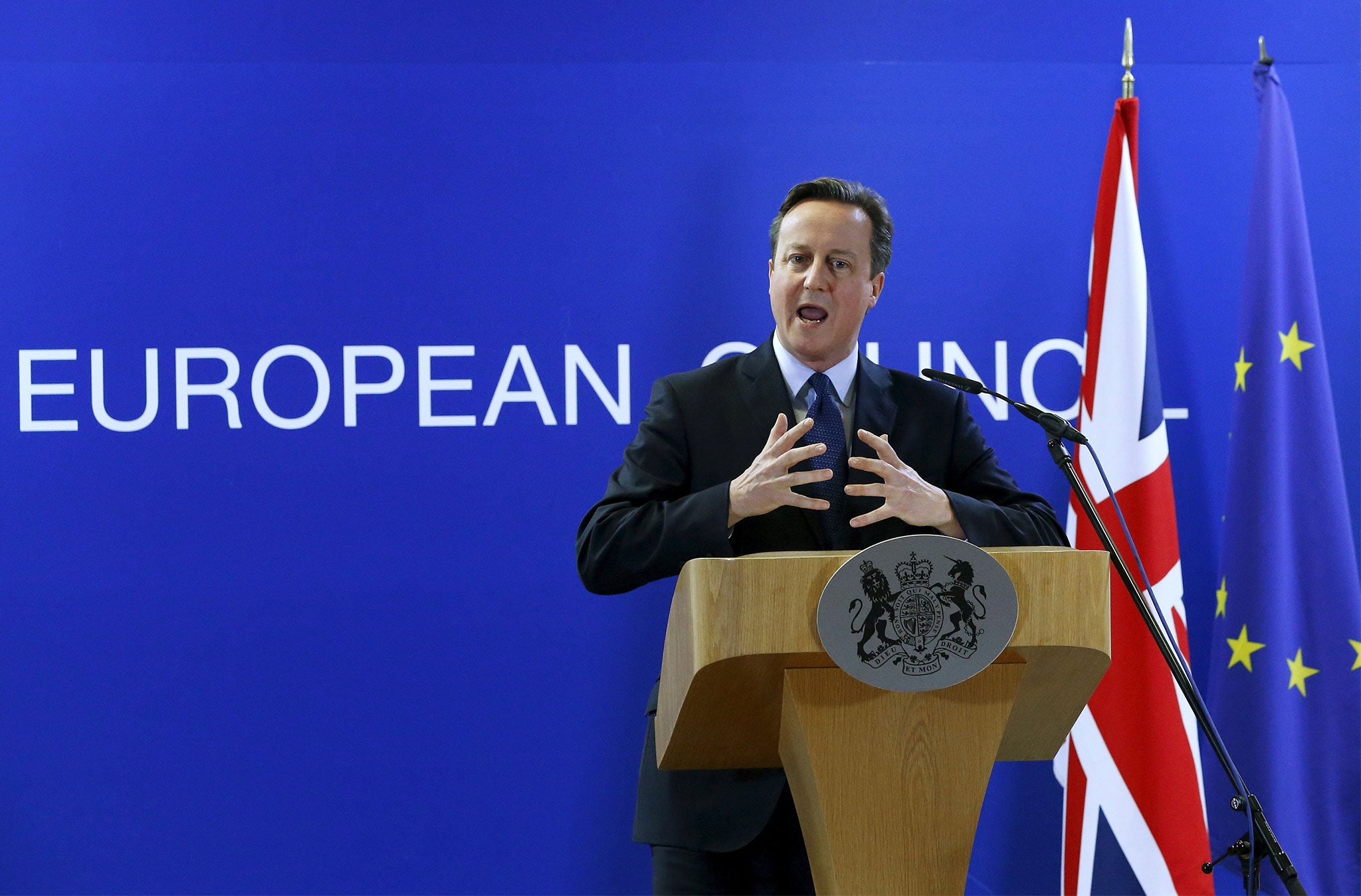David Cameron hails 'big step forward' after winning backing for EU reforms in Brussels summit
Prime Minister says: 'There is a pathway to an agreement. I am confident of that after the discussion that we have had'

David Cameron has hailed a "big step forward" in his attempts to renegotiate Britain’s relationship with the European Union after winning the backing of other EU leaders for "legally binding" and substantial reforms.
After several hours of talks in Brussels – including a 40-minute presentation by the Prime Minister – Mr Cameron emerged to claim their was now a clear "pathway" to a deal to be finalised at the next European summit in February.
The Prime Minister indicated that progress has also been made on the impasse over British demands for a four-year ban on in-work benefits for migrants and highlighted the summit communiqué which instructed the European Council to work towards "mutually satisfactory conclusions" in all areas of British demands.
"It was a very substantial discussion going into real detail on all the areas that I have put forward," Mr Cameron said afterwards.
"There is a pathway to an agreement. I am confident of that after the discussion that we have had. Really good progress has been made.
We have taken a big step forward for a better deal for Britain but there is still a lot of hard work to be done.
"We have taken a big step forward for a better deal for Britain but there is still a lot of hard work to be done. And it is going to have to be done between now and February but there is a path through this."
Mr Cameron was thrown a lifeline by the German Chancellor Angela Merkel who told reporters after the summit that Germany was prepared to consider treaty change to enshrine the new deal with Britain. Treaty change will be of symbolic importance during the referendum campaign and would allow Mr Cameron to claim that any deal he strikes could not be undone at a future date.
However President Francois Hollande was notably more cautious suggesting France was opposed to committing the EU to future changes as a result of the British renegotiation.
Mr Cameron addressed the meeting of 27 other leaders during dinner in which he urged fellow leaders to make compromises on key issues the UK public "care about".
"The levels of migration we have seen in a relatively short period of time are unprecedented, including the pressures this places on communities and public services," he told them.
"This is a major concern of the British people that is undermining support for the European Union. We need to find an effective answer to this problem."
After he spoke several leaders including Ms Merkel and Mr Hollande spoke and assured the Prime Minister they were intent on finding a deal that would allow Britain to remain within the EU while the Irish Taoiseach Enda Kenny said: "The Prime Minister has asked for our help and we should give it to him."
The European Council president Donald Tusk said he would aim to table a text on proposed reforms in the run-up to the next meeting of the council in February.
Mr Tusk characterised the discussions over dinner as "substantive and constructive".
"Prime Minister Cameron set out in detail his position, in particular regarding benefits and free movement," he said.
"He explained his request for a model based on four years and reiterated his openness to alternative solutions only if they could achieve the same objective.
"Leaders voiced their concerns but also demonstrated willingness to look for compromises.
"Building on this positive debate, we agreed to work together to find solutions in all four baskets raised by Prime Minister Cameron. Hard work on all baskets is still ahead of us.
"First we will work closely with the UK and the (European) commission and in the run-up to the February European Council, I will table a concrete text to all the leaders."
The mood music was notably more optimistic than at the start of the talks when the Prime Minister was looked isolated on his totemic demand that Britain should be allowed to restrict in-work benefits to workers from other European countries for four years.
As they arrived for the Council meeting in Brussels leader after leader lined up to criticise Mr Cameron’s proposals as unworkable and against the fundamental tenants of the single market.
Significantly the leaders of Poland, Hungary, Slovakia and the Czech Republic issued a joint statement, following a meeting with Mr Cameron ahead of the summit, rejecting any change to European Union laws that would lead to discrimination of their citizens or limit their freedom of movement.
"We consider the freedom of movement one of the fundamental values of the European Union, (and) proposals regarding this area remain the most sensitive issue for us," they said. "In this respect, we will not support any solutions which would be discriminatory."
After the meeting Mr Cameron said his four year proposal was still on the table but that a "solution" not a "compromise" could be found to deal with his demand without infringing upon equal rights and freedom of movement.
Join our commenting forum
Join thought-provoking conversations, follow other Independent readers and see their replies
Comments
Bookmark popover
Removed from bookmarks